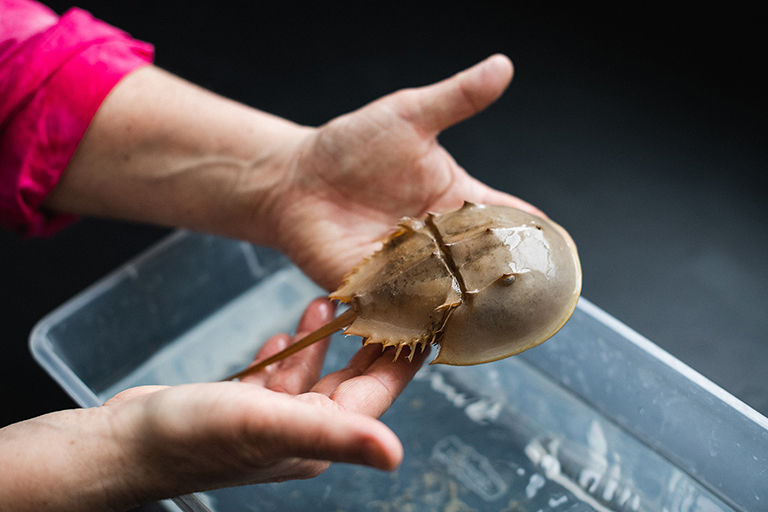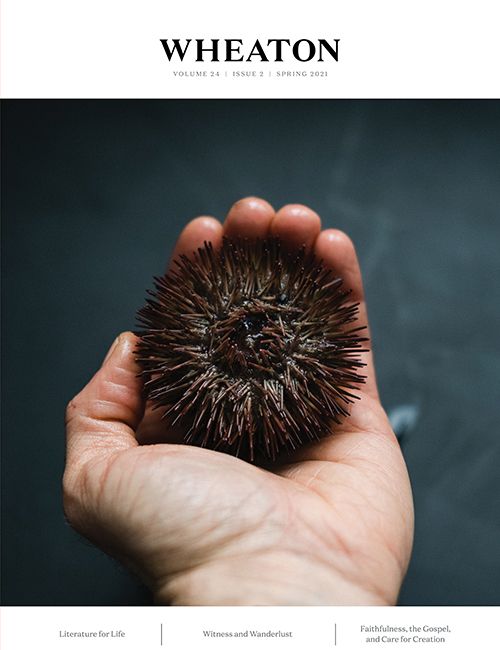Faithfulness, the Gospel, and Care for Creation
Loving our neighbors faithfully means taking seriously the pressing socio-ecological challenges facing so many people around the world. All things are the object of God’s love and restoration. Our loving Creator calls God’s people into God’s mission of mending the entire creation under Christ’s rule.
Words: Ben Lowe ’07 (Environmental Studies),
Rachel Lamb ’12 (Environmental Studies/International Relations),
Ruth Padilla DeBorst M.A. ’87 (Theology)
Photos: Tony Hughes

An Aloe plant in the Biology Department Greenhouse in Meyer Science Center
As the small bush plane neared the coastal Native Village of Tyonek, the remote Alaskan wilderness parted to reveal several buildings nestled close to the water. Rising sea levels and harsh storms had eroded nearly the entire beach, drawing seawater up to the buildings’ front steps.
The plane was carrying a team from Anchorage to help the village assess their climate resilience and install new air and water monitors. Over a community meal, village elders shared reports of how environmental changes were disrupting their way of life, threatening the salmon harvest from the Ch’u’itnu watershed, and challenging their ability to pass down traditional knowledge and customs to their grandchildren. While they embodied a spirit of resilience, the future of the Tyonek (Tebughna) people remained irrevocably caught up in a rapidly changing environmental crisis they had little responsibility in creating.
One of us (Rachel Lamb ’12) has researched and spent time on the front lines of the climate crisis for over a decade with organizations including the National Aeronautics and Space Administration (NASA) Carbon Monitoring System and the U.S. Climate Alliance. Rachel spent a summer in 2011 working with Indigenous communities in the Pacific Northwest and Alaska to document and share tribal responses to climate change as part of Wheaton’s Human Needs and Global Resources (HNGR) program.1 This immersive experience made concrete and personal the often-abstract issue of global environmental change, grounding its impacts in particular people and places with familiar names and faces.
Another of us (Ben Lowe ’07) serves in leadership roles with multiple national and international Christian environmental organizations and was awarded a fellowship by the National Science Foundation (NSF) for research on the human and religious dimensions of environmental change. Ben was similarly confronted with the impacts of changing climate patterns during the summer between his junior and senior years at Wheaton while participating in an international research project along the Tanzanian shore of Lake Tanganyika.

Dr. Nadine Folino Rorem, Professor of Biology, holds Biology Department “pet” “Clawdette,” a horseshoe crab (Limulus polyphemus) in the invertebrate zoology lab. Dr. Rorem told us that this organism is known for its use in medicine for the Limulus amebocyte lysate (LAL) test for drugs.
One of the African Great Lakes, Lake Tanganyika is a biodiversity hotspot and sustains a critical regional fishery that provides livelihoods and nutrition for millions of people in the surrounding countries. Tragically, increasing temperatures and weakening seasonal winds across the region are disrupting nutrient flows and undercutting the lake’s ecological productivity.2,3 This is resulting in fewer fish being available for a growing number of fishers, leading to unsustainable harvests, climbing market prices, and concerns around socio-political instability.4,5
Last but not least, another of us (Ruth M.A. ’87) is a theologian and missiologist based in Costa Rica where she lives in Casa Adobe, an intentional Christian community, and leads the Comunidad de Estudios Teológicos Interdisciplinarios. She recently served as the John Stott Visiting Scholar at Wheaton. Through various leadership roles over the years at Resonate Global Mission, World Vision International, the Latin American Theological Fellowship, the International Fellowship for Mission as Transformation (INFEMIT), and more, Ruth has witnessed the importance of pursuing integral mission, building community across the global church, and listening to the voices of marginalized communities. As Rev. Leith Anderson, then president of the National Association of Evangelicals (NAE), put it in a landmark NAE report:
While others debate the science and politics of climate change, my thoughts go to the poor people who are neither scientists nor politicians. They will never study carbon dioxide in the air or acidification of the ocean. But they will suffer from dry wells in the Sahel of Africa and floods along the coasts of Bangladesh. Their crops will fail while our supermarkets are full. They will suffer while we study.6
BIPARTISAN POLITICS AND BIBLICAL DISCIPLESHIP
As impacts from climate disruption intensify across the world, one of the barriers to action we face is that environmental issues in general, and climate change in particular, have become viewed by many as controversial and politically partisan. While the polarization surrounding these issues is acute in the United States, it is also relatively recent. There are numerous Christian conservatives today—such as former U.S. Representative Bob Inglis7 (R-SC) and Ericka Andersen8—who are outspoken advocates for climate solutions founded on free enterprise and innovation. While climate and environmental protection often involve policy solutions, they are not inherently partisan concerns, and we have been grateful through the years to work with leaders from across the political spectrum who care deeply about God’s world.

Transplanting aloe plant to a larger pot in Biology Department Greenhouse
At a more fundamental level, however, before these are even political issues, they are first and foremost biblical issues. For us and countless others across the global church, our commitment to caring for creation and addressing climate change is motivated by our love for Christ and deeply rooted in historic Christian faith and doctrine. Biblical theology helps us understand that these are not just environmental, social, political, or economic problems. Rather, they are symptoms of deeper ills including greed, pride, selfishness, apathy, and idolatry. In other words, they are moral problems, spiritual problems, sin problems. And we can no more save ourselves than we can save our communities or God’s earth.
Amid this bleak reality, however, there is good news of great hope. For there is a solution to sin and all its pervasive and deadly repercussions. The Good News—the gospel—is that, in Jesus Christ, the Creator God entered into the created order to make right all that is broken, “to reconcile to himself all things, whether things on earth or things in heaven, by making peace through his blood, shed on the cross” (Colossians 1:19-20, NIV). God’s reconciling love includes individuals being set right with God but it also encompasses so much more. All things—i.e., the entire creation—are the object of God’s love and restoration. And the loving Creator calls God’s people into God’s mission of mending the entire creation under Christ’s rule.
Loving our neighbors and caring for the rest of creation— which in this era necessarily include addressing climate change—are integral to the Good News of the kingdom and reign of God, and we can step into this dimension of biblical mission in full confidence that one day there will be no more groaning for us or the rest of creation (Romans 8). For all things will be renewed, shalom will be restored, God Almighty will dwell with us, and we will rule together in harmony as it was in the very beginning (Revelation 21-22).
Even now, however, we can be part of restoring the people and places where God has called us. For every one of us is created as an image bearer to reflect God’s character and represent God’s rule out into the world (Genesis 1-2). We are at once both recipients of and partners in the good news of the kingdom of God; we are being reconciled to reconcile, transformed to transform, and restored to restore.

A sea urchin (Lytechinus variegatus) in the invertebrate zoology lab.
These are not new ideas. Creation care has long shaped the work and witness of Christians around the world, even if it has become a blind spot in some of our churches and Christian institutions. For instance, note the words, beliefs, and values of the Lausanne Movement, founded by the Rev. Billy Graham ’43, Litt.D. ’56, and Rev. Dr. John Stott. At their Third Lausanne Congress in 2010—at which one of us (Ruth) was a key note speaker, and which Christianity Today described as “the most representative gathering of Christian leaders in history”—the group reaffirmed the relationship between the good news and creation.9
The Bible declares God’s redemptive purpose for creation itself. Integral mission means discerning, proclaiming, and living out the biblical truth that the gospel is God’s good news, through the cross and resurrection of Jesus Christ, for individual persons, and for society, and for creation. All three are broken and suffering because of sin; all three are included in the redeeming love and mission of God; all three must be part of the comprehensive mission of God’s people.10
At the core, we cannot love God fully without caring for the good world that God made, sustains, redeems, and entrusts into our stewardship. Similarly, we cannot love our neighbors faithfully unless we take seriously the pressing socio-ecological challenges that so many people face around the world. While we are all ultimately affected by climate and environmental problems, it tends to be those already marginalized and vulnerable who are impacted the earliest and the most acutely—and yet have the least resources and capacity to adapt.
GROWING AWARENESS AND CONCERN
In light of such inequities, what does it mean to stand in unity with our sisters and brothers in the United States and around the world as we seek mutual flourishing for all people and places? This is an important question facing the church in this era, when human activities are now shaping the world even more profoundly than natural processes.11,12
In recent years, younger generations in particular have been stepping up to raise their voices and take greater responsibility for the world they are inheriting.
A national survey one of us (Ben) recently conducted with students at Christian universities across the United States, including Wheaton College, is shedding new light on shifts in attitudes and engagement that appear to be taking place.13 Over 80 percent of the students surveyed affirmed that the climate is changing with over 75 percent affirming that humans are contributing to these changes. Three quarters of respondents said that addressing global warming should be a medium or high priority for themselves as well as for their campus and for Christians in general. These levels increased to approximately 80 percent when students were asked how much addressing biodiversity loss should be a priority.
Meanwhile, about 60 percent said that their campus is doing too little to address either climate change or biodiversity loss, with less than 2 percent of students saying their campus is doing too much. Church engagement is perceived to be even more lacking here, with about two thirds responding that their church is doing too little, and less than 1 percent reporting that their church is doing too much. These numbers help highlight a growing need and opportunity for Christian communities to model and disciple God’s people in greater faithfulness around these growing challenges. The gospel has much to offer here, interest and concern are growing across the church and society, and, as the three of us have experienced, institutions like Wheaton College have a transformative role to play in student formation.
ENVIRONMENTAL THOUGHT LEADERSHIP AT WHEATON
As Wheaton alumni, it was the rigorous and integrative liberal arts training we received across the natural and social sciences, humanities, and biblical and theological studies that God used to connect the dots between a changing climate system and our calling to be faithful disciples and witnesses in today’s world. Our Wheaton education provided an integrated worldview and theological grounding that has helped us better value all of God’s creation, understand what is happening across the world and how we fit in, and find purpose and hope in God’s redemptive mission.
Wheaton has a long history as a leader in Christian environmental thinking and scholarship. Francis Schaeffer, who gave a series of famous lectures at Wheaton College in the 1960s, authored a seminal book on this topic titled Pollution and the Death of Man (Tyndale House, 1970; reprinted edition Crossway, 1992), which remains in print today. Another notable example is the major climate change conference that took place on campus in 2007 and featured Sir John Houghton, an outspoken evangelical, renowned climatologist, and the longtime scientific leader of the Nobel Peace Prize-winning Intergovernmental Panel on Climate Change (IPCC-WG1). Sponsored by Wheaton’s Center for Applied Christian Ethics, this conference drew Christian leaders and student representatives from CCCU institutions across the country.
Throughout this time, numerous professors from across the natural and social sciences as well as biblical and theological studies have been conducting rigorous research and teaching that has contributed a vast wealth of knowledge and resources that engage climate and environmental issues from distinctly Christian perspectives. Some of the faculty we have personally been blessed to learn from and collaborate with include (in alphabetical order): Drs. Jamie Aten, Vince Bacote, Daniel Block, M. Daniel Carroll, Dorothy Chappell, Jim Clark, Norm Ewert, Jeff Greenberg, Susan Greener, P. J. Hill, Chris Keil, Ray Lewis, Andrew Luhmann, Douglas Moo, Steve Moshier, Alvaro Nieves, Kristen Page, Sandra Richter, Paul Robinson, Nadine Rorem, Noah Toly ’99, M.A. ’12, Fred Van Dyke, and Laura Meitzner Yoder.
As a result of this rich heritage, Wheaton students and alumni have been instrumental in helping to start and lead numerous fruitful climate and environmental efforts on campus and across the church and society. This includes Young Evangelicals for Climate Action (yecaction.org), which is a growing movement of young Christians across the United States who are “coming together and taking action to overcome the climate crisis as part of our Christian discipleship and witness.”14 The three of us are also heavily involved with A Rocha, an international Christian conservation organization active in 20 countries across 5 continents (and which John Stott supported) that has sponsored a student chapter at Wheaton College for nearly two decades.
On campus, Wheaton offers a range of highly relevant courses and programs including both a major and minor in environmental science as well as a certificate in environmental sustainability. The Center for Applied Christian Ethics, Human Needs and Global Resources, the Humanitarian Disaster Institute, the Center for Urban Engagement, and the Center for Faith, Politics, and Economics also bring significant leadership and resources to bear in engaging climate and environmental issues from their various interdisciplinary areas of focus. In diverse and inspiring ways, these groups are demonstrating love for God and neighbor by pursuing creation care and climate action. They offer a multitude of opportunities to support, amplify, and participate; and effect positive change.
TOWARD GREATER FAITHFULNESS
We face many serious challenges, and the growing harm from climate disruption and environmental degradation is one we cannot ignore. Caring for and cultivating the earth and each other are some of the very purposes for which we are created as God’s image-bearers. Rising to address these challenges provides an opportunity for more faithful discipleship and witness in the world today. There is much good, grace-filled work yet to do in cultivating deeper and healthier relationships with each other and the rest of creation. This includes prayerfully reflecting, repenting, and reforming our individual and collective attitudes, behaviors, and systems so that they do less harm and bear good fruit instead—for we are ultimately not created to be less of a curse but more of a blessing.
As we press into these issues, we will increasingly find that the problems we face are often interconnected. We cannot address climate and environmental concerns without engaging issues of development, health, human rights, immigration, poverty, race, and more. One thing ecology helps us understand is that all things are connected, and the gospel gives us hope that all things are reconciled through Jesus. As in all areas of faith and life, this is an ongoing journey that we are all called to travel together. Success in this journey is defined by faithfulness, which involves continuing to take prayerful and worshipful steps forward and never tiring in doing God’s good work as we continue to grow together into the likeness of Christ, the Creator, Sustainer, and Reconciler of all things.
1 Rachel Lamb and Michelle V. Davis, “Promoting Generations of Self-Reliance: Stories and Examples of Tribal Adaptation to Change” (white paper, U.S. Environmental Protection Agency, 2011), https://data. globalchange.gov/report/epa-stories-2011.
2 Catherine M. O’Reilly et al., “Climate Change Decreases Aquatic Ecosystem Productivity of Lake Tanganyika, Africa,” Nature 424, no. 6950 (August 14, 2003): 766-8.
3 Piet Verburg, Robert E. Hecky, and Hedy Kling, “Ecological Consequences of a Century of Warming in Lake Tanganyika,” Science 301, no. 5632 (July 25, 2003): 505-7.
4 Andrew S. Cohen et al., “Climate Warming Reduces Fish Production and Benthic Habitat in Lake Tanganyika, One of the Most Biodiverse Freshwater Ecosystems,” Proceedings of the National Academy of Sciences 113, no. 34 (August 23, 2016): 9563-8.
5 Benjamin S. Lowe et al., “Adapting to Change in Inland Fisheries: Analysis from Lake Tanganyika, East Africa,” Regional Environmental Change 19 (2019): 1765-76.
6 Dorothy Boorse, ed., “Loving the Least of These: Addressing a Changing Environment,” National Association of Evangelicals, 2011, https://www.nae.net/loving-the-least-of-these/.
7 George Mason University, Center for Climate Change Communication, “Bob Inglis,” https://republicen.org/bob.
8 Ericka Andersen, “I’m a Conservative Christian Environmentalist. No, That’s Not an Oxymoron,” New York Times, August 7, 2020, https:// www.nytimes.com/2020/08/07/opinion/republicans-climate-change. html.
9 Andy Crouch, “Underrepresented at Cape Town,” Christianity Today, October 22, 2020, https://www.christianitytoday.com/news/2010/october/ underrepresented-at-cape-town.html.
10 Lausanne Movement, “We Love God’s Word” in The Cape Town Commitment: A Confession of Faith and a Call to Action (Peabody, MA: Hendrickson Publishers, 2011).
11 Paul J. Crutzen, “Geology of Mankind,” Nature 415, no. 6867 (January 3, 2002): 23.
12 Simon L. Lewis and Mark A. Maslin, “Defining the Anthropocene,” Nature 519, no. 7542 (March 11, 2015): 171-80.
13 This study was conducted in the Spring of 2020 and sampled 1,667 undergraduate students in select general education and introductory science courses at 35 CCCU institutions across the United States. The results are in the process of being submitted for publication and inquiries may be directed to benlowe@ufl.edu.
14 Young Evangelicals for Climate Action, “About Us,” https://yecaction. org/about-us/what-we-do.html. See also Rachel L. Lamb, Benjamin S. Lowe, and Kyle J. Meyaard-Schaap, “Renewing Evangelical Engagement on Climate Change: The Birth and Growth of ‘Young Evangelicals for Climate Action,’” Perspectives on Science and Christian Faith 71, no. 1 (March 2019): 50-4.
